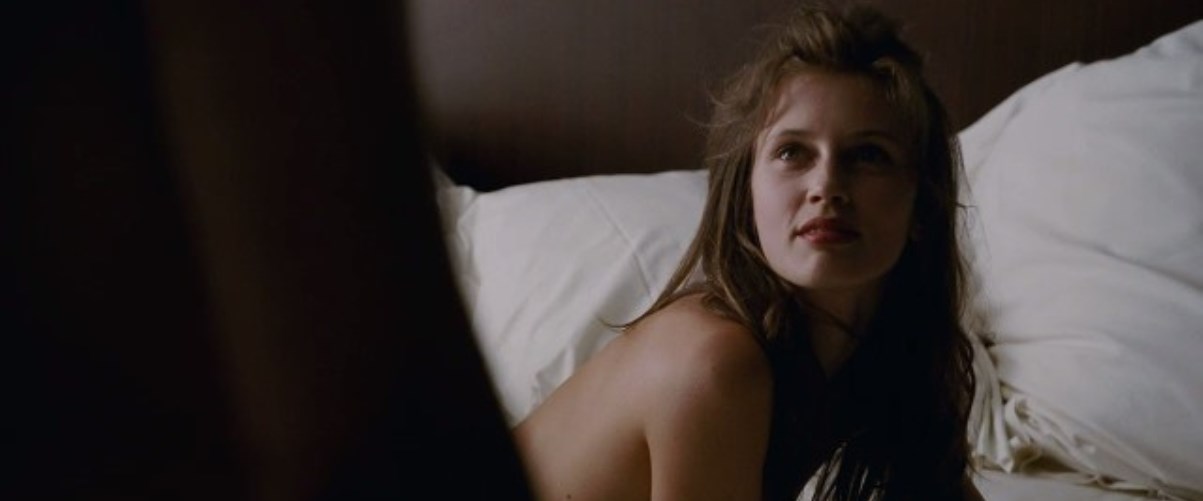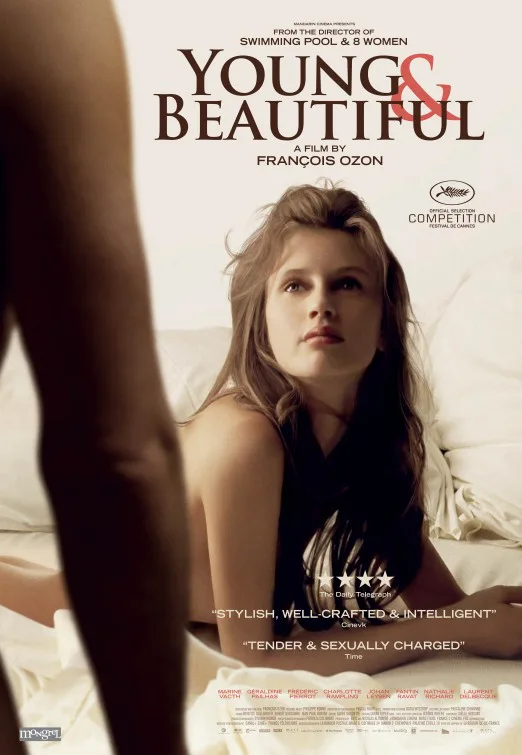One of the destabilizing and pleasurable aspects of “Young and Beautiful,” a story about a 17-year-old girl named Isabelle (played, hauntingly and effectively, by newcomer Marine Vacth) who decides to go to work as a prostitute is that writer-director Francois Ozon does not trouble himself with trying to diagnose, explain, or provide a backstory. There is not an inciting event that one could point to and say, “This is why Isabelle does what she does.” Isabelle’s actions are presented simply and nonjudgmentally, the camera following her up and down escalators, up and down hallways, and catching her mirrored reflection in various hotel rooms. “Young and Beautiful” has a very formal and elegant structure, broken up into four seasonal chapters, each one attached to a thematically-appropriate Francoise Hardy pop song. The structure provides a huge echoing space, evocative of the blank dissociation accompanying much of the sex seen in the film. The mood is one of yearning restless adolescence, sometimes melancholy and sometimes dangerous; familiar territory to Ozon. Ozon is interested in what hormones can do when they first explode. Beyond that, we are left to decide. “Young and Beautiful” doesn’t have the eerie power of some of Ozon’s other films, like “In the House” or “Swimming Pool,” but it is still a fascinating experience.
“Young and Beautiful” opens in summer with a middle-class French family on holiday by the seaside. Isabelle is first seen sunning topless on the beach through the lenses of binoculars held by her younger brother Victor (Fantin Ravat). From the very first image, we see Isabelle through another’s eyes. Victor trails along behind Isabelle, disturbed and intrigued by his sister’s blossoming sexuality, and wanting all the details about the secret dates she’s having with a German hunk named Felix (Lucas Prisor). Isabelle doesn’t want to bring Felix home to meet her parents. He seems dumb as a box of rocks; they wouldn’t approve. So Victor provides distractions as she sneaks out of the house.
She loses her virginity to Felix on the beach one night. We see her lying beneath him, and a look of unbearable sadness and loneliness rises up into her beautiful face. She glances off to the side, and sees herself standing there, looking on. It is a curious and powerful moment suggesting the level of her dissociation. Her sexuality, at that young age, is somewhat abstract. She’s still a kid. She has feelings, she wants things, dreams about things, and yet the reality is totally different from what she imagined. Maybe she’s just glad to get it over with, but the image of herself standing there on the beach, looking on, haunts the rest of the film.
The next time we see Isabelle, she is back in the city with her family, starting her senior year, and working as a prostitute after creating a profile on an adult site that sets girls up with clients. She meets these men in various high-end hotel rooms, stealing a gray silk shirt from her mother to wear under her conservative blue suit. She doesn’t seem to get any pleasure out of the sex, and goes through the motions with a poker face. Her family has money, so she is not doing it for that reason. Some of her encounters with clients border on the weird, but the men are seen as mostly lonely guys who want certain things that she can provide. The encounters don’t seem to touch her.
Until she meets Georges (Johan Leysen), an elderly guy who becomes a regular. Their scenes together are amazing. He is curious about her, and she is detached and cold. But there is a kind of tenderness that opens up between them, and she feels comfortable during her times with him. When things with Georges go south, alarmingly, swiftly, she is shaken. Isabelle has devoted her life to sex that has no meaning, outside of the monetary reward. But something opens up in the air between her and Georges, through the sex, that is perhaps more adult than she is ready to confront or even experience. The tension that comes from not knowing why Isabelle has made these choices is beautiful. It does not condescend to the sexuality of its young lead. It understands that half the time she actually doesn’t know what she is doing. And isn’t that so often the case when you are 17.
Interspersed with the scenes with clients, we see Isabelle in operation in her other lives: her family, her parents, her classmates. In one great scene, Isabelle sits in an English class and the teacher starts a discussion about Rimbaud’s poem “Novel,” which includes the lines:
No one’s serious at seventeen. –On beautiful nights when beer and lemonade And loud, blinding cafés are the last thing you need –You stroll beneath green lindens on the promenade.
In a scene that feels improvised, the students discuss what those lines mean to them. They feel like real kids. When you’re 17, you have no concept that your youth will not last forever; you have no understanding that you will look back on this particular “season” and perhaps see it a little bit differently. Rimbaud’s poem helps crack open that reality for them. Isabelle does not participate in the discussion. “No one’s serious at seventeen,” Rimbaud? Well, she is. The secrets she keeps are enormous and threatening. Maybe that’s the biggest thrill of all for her, showing how close to childhood she still is. Having a secret makes you feel powerful.
Her parents are caring individuals, and open-minded, but they have no idea what is going on with their daughter. Isabelle’s mother (the wonderful Geraldine Pailhas) also has a secret, and it isn’t revealed until later in the film. Isabelle’s reaction to the reality of her mother’s sexuality, still in operation, still trying to get its needs met, is one of hurt and loss. When her mother discovers Isabelle’s secret, the comfortable family relationships break apart, and the unspoken understanding that families “know” one another is shattered. Pailhas loses it, in a confrontation scene both painful and violent.
All of this could tip over into sheer melodrama in less confident hands. Ozon keeps the details to a minimum, allowing us to just sit back and observe. There may be times when we are afraid for Isabelle, alone in a hotel room with these men who want her to do certain things they will pay for. She is seen descending escalators into darkness or ascending into the light, carrying her big school bag, dressed up in a suit that makes her look older, strolling down lush hotel hallways with her back to the camera. The film, from its first shot of her through the binoculars, shows how very precarious and thrilling it can be, being a young and beautiful girl.




















